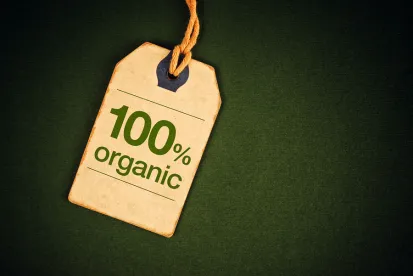With the clean beauty movement on the rise, the Federal Trade Commission (FTC) has started to pay closer attention to how companies label and market personal care products. Although the FTC does not have its own definition of the term “organic,” it can bring enforcement actions based on allegedly false or deceptive advertisement of products labelled as “organic” under standards promulgated by other agencies.
For example, the FTC recently brought an enforcement action against Truly Organic Inc. for false and deceptive advertisement alleging that the company labelled its personal care products as “certified organic,” “USDA certified organic,” and “100% organic” when they did not meet the necessary organic content requirements under the USDA. Additionally, the FTC claimed that Truly Organic altered USDA organic certification documents to claim that the company itself had been USDA certified and supplied falsified Material Safety Data Sheets to third parties to use in marketing its products.
The USDA regulates the term “organic” through its National Organic Program (NOP). The NOP regulations allow cosmetic, body care products, or personal care products that contain or are made up of agricultural ingredients to be certified organic. Once certified, the products are eligible for the same organic labeling categories as all other agricultural products: “100% organic,” “organic” and “made with organic ingredients.” Products with less than 70 percent organic ingredients generally should not use the term “organic” anywhere on the principal display and should not display the USDA Organic Seal. However, these products may list specific, USDA-certified ingredients on the ingredients statement. For example, a product that contains USDA-certified coconut oil may list the organically produced coconut oil in the ingredients statement, even though the product itself is less than 70 percent organic.
Each labeling category has its own specific organic content requirements. For example, to be eligible for the “100 percent organic” label, the product must contain “only organically produced ingredients,” excluding salt and water. To be eligible for the “organic” label, products “must contain at least 95 percent organically produced ingredients (excluding water and salt),” while products containing “at least 70 percent organic ingredients” are eligible for the “made with organic ingredients” label and generally should not display the USDA Organic Seal. According to the FTC, Truly Organic labelled its personal care products using USDA organic labeling categories when they did not meet the necessary organic content requirements for those categories.
Although Truly Organic paid a $1.76 million settlement as a result of the FTC’s allegations, this enforcement action may be an outlier because it involves more than the mislabeling of products. Specifically, the FTC’s allegations that the company actually altered USDA organic certification documents to claim that the company itself had been USDA certified and supplied falsified Material Safety Data Sheets to third parties to use in marketing its products is likely what caused the FTC to unanimously approve such a high settlement amount. Additionally, in a separate statement, Commissioner Rohit Chopra explained that the Truly Organic resolution makes it clear that the FTC is committed to consequences for dishonesty and fraud, and that in cases involving such conduct, no-money settlements are inadequate. Commissioner Chopra also called for the FTC to release a policy statement that codifies a more harsh approach to unlawful conduct that is dishonest or fraudulent. Therefore, companies should keep an eye out for how the FTC continues to regulate false or deceptive advertisement of products labelled as “organic” in the personal care space.




 />i
/>i

